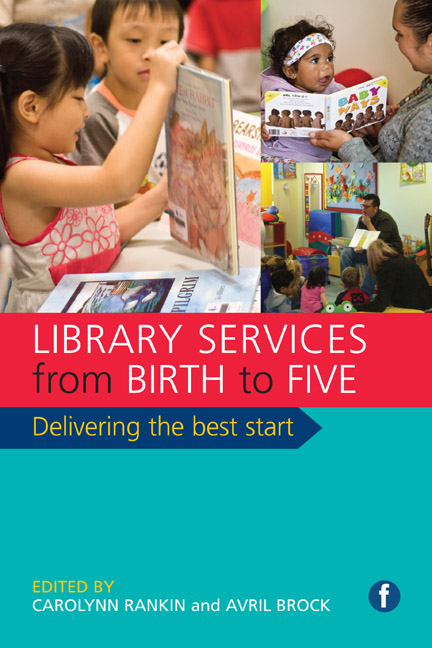Book contents
- Frontmatter
- Contents
- List of figures and tables
- Contributors
- Acknowledgements
- Introduction
- 1 Take them to the library: the pathway of opportunity
- 2 What you need to know about promoting early reading with young children from birth to five
- 3 Attribute value wrong, It should be `City of Literature ... it all starts with ABCD! The City of Melbourne and the Abecedarian Approach
- 4 Transforming practice through research: evaluating the Better Beginnings family literacy programme
- 5 People and partnerships, skills and knowledge
- 6 Resources for early years libraries: books, toys and other delights
- 7 Using digital media in early years library services
- 8 Using play to enhance early years literacy in babies and toddlers: ‘Read, Play and Grow’ at Brooklyn Public Library
- 9 Inclusive early literacy
- 10 Music and rhyme time sessions for the under-fives
- 11 Reaching your audience: the librarian's role
- 12 Successful library activities for the early years and ways to promote books effectively
- 13 Designing family-friendly libraries for the early years
- 14 Planning: organizing projects and money matters in the early years library
- Index
6 - Resources for early years libraries: books, toys and other delights
Published online by Cambridge University Press: 08 June 2018
- Frontmatter
- Contents
- List of figures and tables
- Contributors
- Acknowledgements
- Introduction
- 1 Take them to the library: the pathway of opportunity
- 2 What you need to know about promoting early reading with young children from birth to five
- 3 Attribute value wrong, It should be `City of Literature ... it all starts with ABCD! The City of Melbourne and the Abecedarian Approach
- 4 Transforming practice through research: evaluating the Better Beginnings family literacy programme
- 5 People and partnerships, skills and knowledge
- 6 Resources for early years libraries: books, toys and other delights
- 7 Using digital media in early years library services
- 8 Using play to enhance early years literacy in babies and toddlers: ‘Read, Play and Grow’ at Brooklyn Public Library
- 9 Inclusive early literacy
- 10 Music and rhyme time sessions for the under-fives
- 11 Reaching your audience: the librarian's role
- 12 Successful library activities for the early years and ways to promote books effectively
- 13 Designing family-friendly libraries for the early years
- 14 Planning: organizing projects and money matters in the early years library
- Index
Summary
Introduction
This chapter is about the most important resources in the early years library – those are, of course, the books with their exciting stories, tantalizing tales and wonderful pictures and illustrations. However, this chapter is not just about collections of books but also about how to select and collect a range of resources to meet community needs, in particular the target audience of young children and their families. A range of exciting resources should be available in the bright, welcoming environment of the early years library (as illustrated in Figure 6.1). It is important to have knowledge about children and their families’ culture, heritage, language and interests, so as to ensure that a breadth of valuable resources is provided. The chapter also illustrates why early years librarians need to have knowledge of diverse resources such as treasure baskets, toy libraries, storysacks and Bookstart packs. We will discuss how to select books that are appropriate for babies and young children, girls and boys, additional-language learners and children with special educational needs, not forgetting their parents. Sources of information to facilitate selection, and reviews of resources, have been included to make this job easier.
Collection development and management
Before we take a more detailed look at the resources in an early years collection, consider the underlying principles and requirements of collection development (see Sullivan, 2013). An understanding of this is important if you are to be an effective advocate for your library and user community. To be able to manage your resources effectively it is good practice to develop an understanding of how your organization operates and knowledge of the local policies. The starting point in collection development is to decide what stock (resources and materials) you are going to include in the library. How is this decided? Information and guidance should be available in the documents produced by library authorities. Many libraries will create collection development policies and stock selection guides to better plan their collections and to justify the allocation of resources. This documentation should reflect statutory requirements and legislation and the requirement to provide resources within a best-value framework. Libraries are under scrutiny to get better value for money from the suppliers who provide books and other resources.
- Type
- Chapter
- Information
- Library Services from Birth to FiveDelivering the best start, pp. 121 - 152Publisher: FacetPrint publication year: 2019



